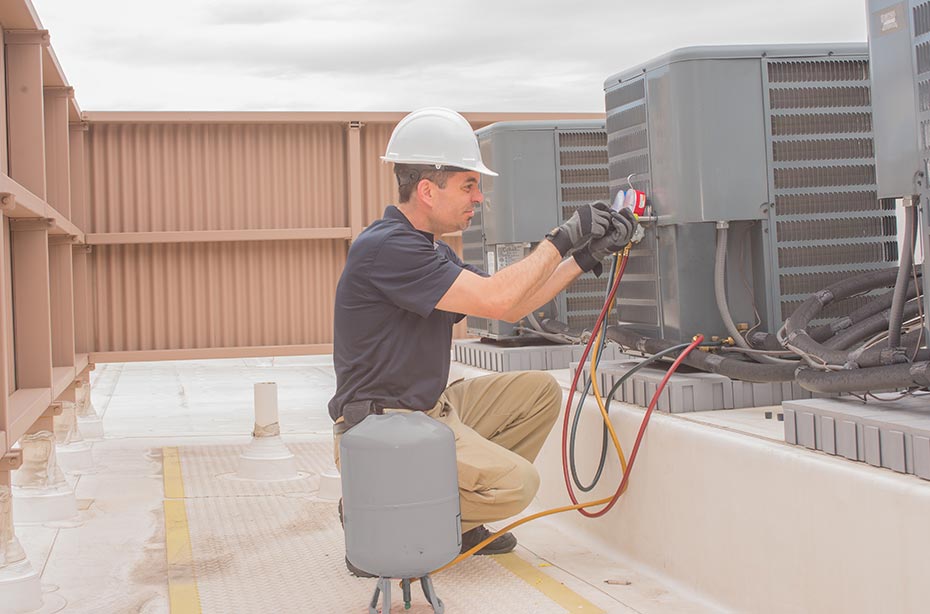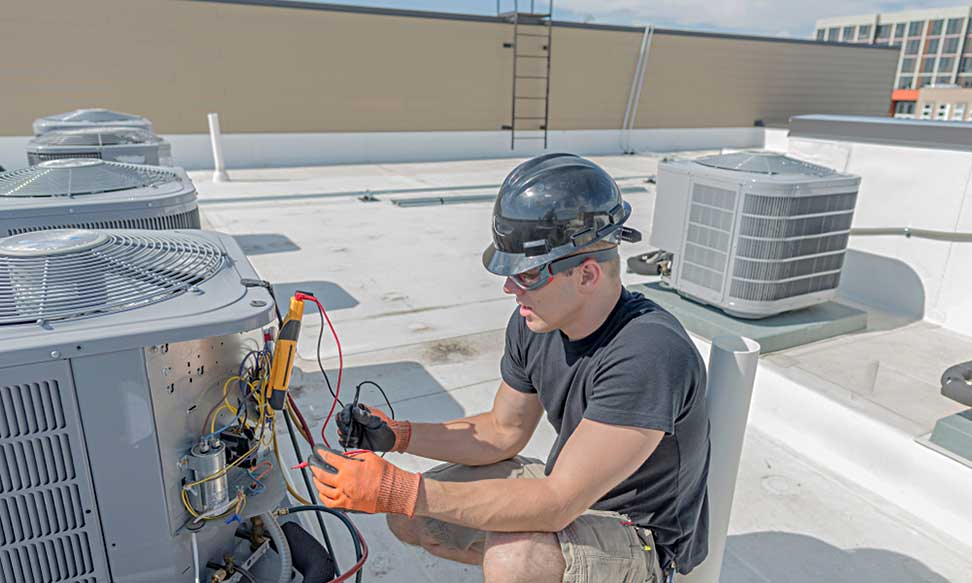Selecting In Between a Heatpump and Heating System: Key Factors To Consider for Your HVAC Demands
When reviewing home heating options for cooling and heating requires, the decision between a heatpump and a heating system can be complex. Each system provides unique benefits customized to certain climates and power performance objectives. Comprehending these differences is vital for making an informed option. Secret elements such as installation prices and environmental influence additionally complicate the option process. Which alternative really straightens with one's comfort and sustainability choices? The following areas will check out these considerations in detail.
Recognizing Warm Pumps: Just How They Work and Their Advantages
While numerous home owners consider numerous home heating choices, recognizing exactly how heatpump function and their advantages can significantly influence their choice. Warmth pumps run by transferring warmth rather than producing it. In the winter, they remove heat from the outside air or ground and transfer it indoors, while in the summertime, they reverse this procedure, cooling down the home by removing warm outside. This double performance makes them functional for year-round environment control.One of the key advantages of heatpump is their energy performance. They utilize substantially less electrical energy compared to standard heating systems, possibly causing reduced utility expenses (heat pump replacement ooltewah tn). Additionally, heat pumps have a smaller sized carbon impact, making them an eco friendly selection. They additionally need less upkeep than conventional systems, contributing to long-lasting cost savings. Overall, understanding the auto mechanics and advantages of warmth pumps can help house owners make notified choices regarding their heating and cooling requirements
Checking Out Heating Systems: Kinds, Procedure, and Advantages
Heating systems can be found in numerous kinds, including gas, electrical, and oil versions, each with unique functional mechanisms. Recognizing these differences is vital, as they affect effectiveness and heating efficiency. In addition, heating systems supply countless advantages, such as constant heat result and integrity in chillier climates.
Kinds of Heating systems
Heater can differ substantially in design and operation, with heaters being a prominent option among home owners. There are a number of kinds of heaters, each using various fuel resources and innovations. Gas heaters are common, leveraging all-natural gas to produce warmth effectively. Electric furnaces, on the other hand, utilize electrical resistance to generate warmth, often favored for their simple installment. Oil heaters, while less usual, are effective in locations with limited gas accessibility (heat pump installation ooltewah tn). Additionally, condensing heating systems optimize power effectiveness by reusing and recording exhaust gases. Each type operates via a system of heat exchangers and ductwork to disperse cozy air throughout a home. Recognizing the differences between these heating system kinds is crucial for notified a/c decisions
Benefits of Heating systems
For homeowners seeking reputable heat during cold months, the advantages of heating systems are significant. Furnaces supply consistent home heating, guaranteeing also temperature levels throughout the home. They are specifically effective in extreme cool, often outshining heatpump in frigid problems. Different types, including gas, electrical, and oil heaters, supply flexibility to satisfy varied requirements and preferences.Furnaces likewise often tend to have reduced first installment prices contrasted to heatpump, making them a more available choice for several. Their robust style adds to a much longer lifespan, with numerous systems lasting over 15 years with correct upkeep. In addition, modern-day heating systems are frequently geared up with advanced technology for improved efficiency, which can bring about lowered energy bills. Overall, heaters stay a reputable choice for effective home heating.

Energy Performance: Contrasting Warmth Pumps and Furnaces
When comparing energy effectiveness between heatpump and heating systems, the Seasonal Energy Effectiveness Proportion (SEER) plays an essential duty in determining efficiency. Furthermore, an operational cost evaluation discloses the long-term economic implications of each system. Recognizing these variables can direct property owners in making notified decisions about their heating services.
Seasonal Energy Efficiency Ratio
Energy performance plays an important function in the decision-making procedure in between warm pumps and furnaces, especially when considering the Seasonal Power Performance Ratio (SEER) This metric measures the cooling efficiency of heatpump over an entire air conditioning period, offering a standardized way to review performance. Higher SEER rankings show higher power efficiency, equating to reduced power intake and decreased energy expenses. On the other hand, heaters are usually assessed making use of the Yearly Fuel Application Effectiveness (AFUE) rating, which mirrors home heating performance. When comparing these 2 systems, property owners ought to focus on SEER scores for warmth pumps, as they straight effect general energy cost savings and environmental sustainability. A detailed understanding of SEER can notably influence the long-lasting complete satisfaction and cost-effectiveness of the picked heating and cooling solution.
Functional Price Evaluation
Comprehending the operational expenses connected with warmth pumps and furnaces is important for homeowners evaluating Related Site their options. Heatpump normally supply greater power effectiveness, transforming electrical power right into warmth with marginal waste. This results in reduced monthly energy bills, especially in modest environments. Conversely, conventional furnaces, specifically gas models, might have lower upfront costs but can sustain greater operational expenses in time as a result of fuel prices and efficiency ratings.Moreover, warm pumps can operate as both home heating and cooling systems, potentially minimizing the demand for separate a/c devices. While initial financial investments for heatpump may be higher, their long-term cost savings in power efficiency can make them a more economical selection for many families. Careful analysis of neighborhood energy rates is important to establish the best choice.
Installation Prices: What to Anticipate for Each Furnace
Installment prices for heater can differ substantially in between warm pumps and furnaces, affecting home owners' choices. Heatpump usually have greater in advance installation expenses, usually ranging from $3,500 to $8,000, depending on the device size and complexity of setup. This includes the outdoor unit, interior handling system, and required ductwork alterations. On the other hand, heaters tend to have lower preliminary costs, averaging in between $2,500 and $6,000, which can be appealing for budget-conscious house owners. Nonetheless, installment expenditures can boost if considerable ductwork is required.Moreover, the option of fuel kind for heaters-- natural gas, gas, or electrical-- can likewise influence installation prices. While warmth pumps provide energy performance, their preliminary investment may hinder some buyers. Eventually, examining installation expenses together with long-term financial savings and effectiveness will certainly assist homeowners in making educated choices concerning their furnace.
Climate Considerations: Which System Executes Much Better in Your Area
Exactly how do environment problems affect the performance of heater? The efficiency of warm pumps and heaters can vary significantly depending on the local environment. In modest environments, heat pumps succeed by effectively moving warmth from the outdoors air, making them an energy-saving choice. Nevertheless, their efficiency reduces in incredibly cold temperature levels, where they might struggle to remove adequate heat. Alternatively, furnaces, specifically gas versions, give dependable and regular heat no matter exterior problems, making them preferable in chillier regions.In areas that experience milder winter seasons, warmth pumps can run properly year-round, offering both home heating and air conditioning. On the other hand, regions with rough wintertimes usually take advantage of the toughness of heaters. Inevitably, comprehending the neighborhood environment is important when making a decision between a warm pump and a heater, as it directly impacts their operational effectiveness and overall performance.
Maintenance Demands: Long-Term Look After Warmth Pumps vs. Furnaces
While both warmth pumps and furnaces need normal upkeep to ensure peak efficiency, their certain demands and treatment routines differ substantially. Heaters commonly require less frequent attention, with yearly evaluations sufficing to examine for gas leakages, clean filters, and assess total capability. Their simpler design typically permits straightforward repairs.In contrast, warm pumps necessitate semiannual maintenance due to their twin duty in heating & cooling. This includes cleaning coils, checking cooling agent degrees, and guaranteeing that both the interior and outdoor devices work at their ideal. In addition, heatpump maintenance commonly involves more detailed Get More Information elements, making specialist maintenance essential.Neglecting upkeep can cause lessened effectiveness and increased power prices for both systems. Ultimately, property owners must think about these lasting treatment requirements when picking between a heat pump and a heater, as positive upkeep can prolong the life expectancy and efficiency of either system considerably.
Environmental Effect: Selecting a Sustainable Home Heating Alternative
The ecological influence of furnace is a vital analysis for homeowners looking for sustainable choices. Warm pumps are usually much more energy-efficient than typical heating systems, as they transfer warmth as opposed to produce it, significantly lowering carbon discharges. By making use of sustainable energy resources, such as air-source or geothermal heat pumps, property owners can better lessen their environmental footprint.On the other hand, gas heaters discharge greenhouse gases and add to air pollution, though they frequently offer greater heat result. Advancements in technology have led to the development of high-efficiency furnaces that reduce emissions.Ultimately, choosing a home heating system involves evaluating efficiency against environmental influence. House owners are motivated to review neighborhood energy sources and rewards for sustainable systems, making sure an option that straightens with both individual comfort and environmental duty. The choice affects not just immediate convenience yet likewise lasting sustainability and environmental health.
Frequently Asked Concerns
For How Long Do Heat Pumps and Furnaces Commonly Last?
The life-span of heatpump generally ranges from 15 to twenty years, while furnaces can last in between 15 to thirty years. Regular upkeep significantly affects their durability and effectiveness in giving home heating services.
Can I Use a Heatpump in Incredibly Cold Climates?
Heat pumps can run in extremely chilly environments, however their effectiveness decreases as temperatures decrease. In such problems, supplementary home heating sources may be needed to maintain comfy indoor temperatures and assure peak efficiency.

What Is the Noise Level of Heat Pumps Versus Furnaces?
The noise degrees of heat pumps and heating systems vary considerably. Typically, heatpump operate even more quietly than standard heating systems, making them more suitable for those conscious appear, while furnaces might create louder functional sounds during home heating cycles.
Are Heat Pumps Suitable for Both Heating and Air conditioning?
Heat pumps are certainly suitable for both cooling and heating (ductless mini splits). They function by moving heat, supplying efficient temperature control year-round, making them a flexible choice for house owners seeking an all-in-one a/c service
What Size Furnace Do I Need for My Home?
Identifying the appropriate dimension home heating system for a home requires examining variables such as square video, insulation high quality, neighborhood climate, and the home's layout. Consulting an expert can assure an accurate analysis and excellent convenience. Warmth pumps commonly offer higher power performance, transforming electrical power into heat with marginal waste. In moderate climates, warmth pumps excel by efficiently transferring warmth from the outside air, making them an energy-saving alternative. On the other hand, furnaces, particularly gas important site designs, give constant and trusted warmth no matter of outdoor conditions, making them preferable in chillier regions.In locations that experience milder winter seasons, warmth pumps can operate effectively year-round, providing both home heating and cooling. Warmth pumps are generally much more energy-efficient than typical heating systems, as they move heat rather than create it, substantially minimizing carbon discharges. By utilizing eco-friendly energy sources, such as air-source or geothermal warm pumps, property owners can better reduce their eco-friendly footprint.On the other hand, all-natural gas heaters produce greenhouse gases and add to air pollution, though they usually give higher warmth output.